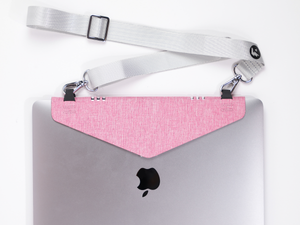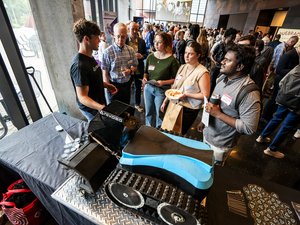
Tech has consequences for our mental health. Kids and adults alike are addicted to devices with full-time access to everything from entertainment to work, with each taking its toll.
But the rise of startups concerned with providing tools to improve mental health, mindfulness, and access to therapy shows tech can also provide tools for coping with stress, anxiety and other related issues.
Aneela Idnani Kumar, CMO of HabitAware, is open about her decades-long struggle with trichotillomania – a disorder that, for her, resulted in the irresistible urge to pull out her eyebrows and eyelashes. She and her husband, Sameer Kumar, developed a device called Keen to track and alert her to the repetitive behavior.
“I began to realize that process of hiding, ignoring, covering up was just as harmful as the actual disorder. It was inhibiting me from living,” Idnani Kumar said. “When we came up with the idea… the device not only helped me regrow my eyebrows. It helped me rebuild this self-confidence that I had been shattering for 20 years.”
HabitAware had a big year: The Minneapolis-based startup won the Minnesota Cup and was one of Time Magazine’s best inventions of 2018. Idnani Kumar said she’s encouraged to see so many more startups focused on helping people access quality care and attain mental healthiness, like she is. Local players she noted include Recovree, Vitals, and Visual.
Investment in mental health companies rose sharply from 2014 to 2015 and has stayed high since then, according to PitchBook. The report noted VCs completed 30 deals with companies focused on mental health by June 2018 – almost five times the total for 2009. PitchBook estimated investment in mental health companies would surpass $500 million in 2019.
Funds went to companies like Calm, an app that introduces users to meditation and works to improve sleep. The company recently raised $27 million from multiple investors.
“Investors are investing in things that solve people’s problems,” Idnani Kumar said. “Staying mentally healthy is a big problem.”
Part of that problem is there aren’t enough tools for “the every-person” she said. People experience barriers to getting therapy, including high costs and too few professionals. Idnani Kumar said general practitioners aren’t equipped to dive into someone’s specific habits, like her compulsion to pull out her eyebrows and eyelashes. But knowing those barriers presents opportunities for innovators, she said.
The Twin Cities may be particularly fertile ground for these kinds of businesses, Idnani Kumar said, based on cultural differences she’s observed in the eight years since she moved from New York.
“As a native New Yorker … I saw a culture very rooted in the outdoors, warmness of community, lack of competition, lack of focus on material things,” she said. “On the whole, people would be able to have a life outside of work here because of the value system. It gives people a little more freedom to think, freedom to be aware, respect for nature – for each other – over things. All that lends itself into more insight into what makes for a healthy mind.”








